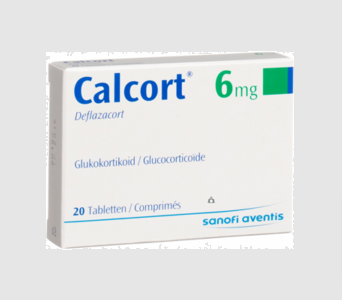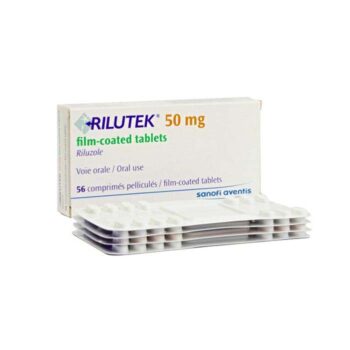Calcort (deflazacort) is a prescription medication classified as a glucocorticoid or corticosteroid. It is used to treat a variety of medical conditions that involve inflammation and immune system responses. Calcort works by suppressing the body’s natural immune and inflammatory processes, which can help alleviate symptoms and improve the overall health of individuals with certain conditions. Here is a comprehensive description of Calcort:
1. Drug Class and Mechanism of Action: Calcort is a glucocorticoid, a type of corticosteroid medication. It functions by acting on specific receptors in the body, known as glucocorticoid receptors, to suppress the immune system’s activity and reduce inflammation. This action is particularly useful in treating conditions where inflammation plays a key role.
2. Indications: Calcort is prescribed for various medical conditions, including:
- Inflammatory Disorders: Calcort is commonly used to treat inflammatory conditions such as rheumatoid arthritis, asthma, and inflammatory bowel diseases like Crohn’s disease and ulcerative colitis. It helps reduce inflammation, pain, and swelling associated with these conditions.
- Allergic Reactions: It can be prescribed to manage severe allergic reactions, including allergic asthma and severe hay fever, by reducing the body’s immune response to allergens.
- Autoimmune Diseases: Calcort is used in some autoimmune diseases like lupus erythematosus and polymyositis to suppress the immune system’s attack on healthy tissues.
- Respiratory Conditions: In cases of severe respiratory illnesses, Calcort can be used to reduce airway inflammation and improve breathing.
3. Dosage and Administration: The dosage of Calcort varies depending on the specific condition being treated, the severity of the condition, and individual patient factors. It is typically taken orally as tablets, with or without food, as directed by a healthcare provider. The medication should be taken exactly as prescribed, and any changes in dosage should only be made under a healthcare professional’s guidance.
4. Effectiveness: Calcort is effective in managing the symptoms and underlying inflammation associated with the conditions for which it is prescribed. It can significantly improve the quality of life for individuals with these conditions, reducing pain, swelling, and other symptoms.
5. Side Effects: While Calcort can be highly effective, it may also lead to a range of potential side effects, particularly when used at high doses or for extended periods. Common side effects may include weight gain, increased appetite, mood changes, insomnia, and changes in skin appearance. Long-term use can lead to more serious side effects such as osteoporosis, increased susceptibility to infections, and changes in blood pressure and blood sugar levels. It is essential to discuss potential side effects with a healthcare provider and to have regular check-ups while on Calcort to monitor for these issues.
6. Precautions and Monitoring: Before starting Calcort, it is crucial to inform your healthcare provider of your medical history, allergies, and all medications you are taking. It is especially important to discuss any history of infections, diabetes, or mental health conditions. Regular monitoring by a healthcare provider is essential to assess the medication’s effectiveness and manage potential side effects.
7. Discontinuation: Calcort should not be stopped suddenly, as this can lead to withdrawal symptoms and a potential flare-up of the underlying condition. Any changes in dosage or discontinuation should be made under the guidance of a healthcare provider.
8. Pregnancy and Breastfeeding: The use of Calcort during pregnancy and breastfeeding should be discussed with a healthcare provider. While corticosteroids like Calcort can be used when the benefits outweigh the risks, caution is advised, and alternative treatments may be considered.
9. Cost and Insurance Coverage: Calcort is a prescription medication, and its cost can vary depending on your insurance coverage and location. Some insurance plans may cover the medication, while others may require prior authorization.
10. Conclusion: Calcort (deflazacort) is a corticosteroid medication used to treat a range of inflammatory and immune-mediated conditions. It is effective in managing symptoms and reducing inflammation but should be used under the guidance of a healthcare provider due to potential side effects, especially with long-term use. Careful monitoring and regular check-ups are essential to ensure the medication’s safety and effectiveness for the specific condition being treated.











Reviews
There are no reviews yet.